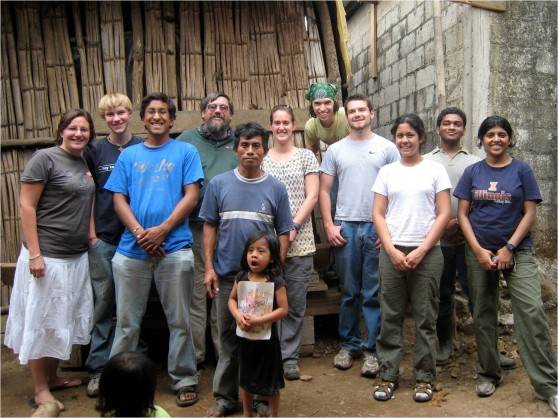Dear Smile Politely Readers,
Have you ever had the desire to help others in the world, but assumed that you couldn’t, thinking it was just too far outside of your reach? While it may seem like a task that is too complex and too massive to take on, or too far removed from our lives here in central Illinois, neither of these ideas is true. As Anne Frank said, “How wonderful it is that nobody need wait a single moment before starting to improve the world.” She was correct, not only in that everyone can help, but also that everyone can improve something TODAY.

We are not so far removed from the effects of poverty abroad. Social and political unrest are products of poverty, injustice, and a lack of what is necessary for humans to lead healthy, happy, and productive lives. Without this kind of social and political unrest, the United States (and our lives) could improve in many ways. Consider how foreign poverty affects our tax dollars and the resources we have in the U.S. Think of the billions of tax dollars that could be invested in our schools, public health, and transportation systems to improve our living situation if we did not have to invest billions in fighting wars against social and political unrest, combating drug traffic from impoverished nations, and reforming an immigration policy to include the millions in need of work that have immigrated here due to lack of resources in their home countries. These are reasons enough to consider how you can help improve the lives of not only your own family and community, but everyone’s families and communities.
Luckily, we don’t have to start from scratch. There are many who have begun working to improve the world in ways that we can all learn from. One of these organizations, Wuqu’ Kawoq (WK) — a registered 501 (c) 3 nonprofit and nongovernmental organization (NGO) that works to provide healthcare and human services to impoverished indigenous populations of Guatemala — aims to raise awareness about the work that they do abroad. September is going to be a big month for WK in Champaign-Urbana. The University of Illinois has graciously allowed WK to put together a lecture series that will highlight the many disciplines that are involved in doing successful international outreach work. This series will show that these individuals are members of our C-U University community and helping in this kind of work is within everyone’s reach.
 The lecture series will include four presentations throughout the next academic year. Each presentation will feature a different doctor who has volunteered in Guatemala with WK, a member of the Engineers Without Borders team at the University of Illinois that has worked in collaboration with WK’s efforts to bring clean water to the populations they serve, and an associate professor of linguistics at the U of I, who studies the indigenous Mayan language Q’anjob’al, and will be discussing the importance and intricacies of working with indigenous language speakers.
The lecture series will include four presentations throughout the next academic year. Each presentation will feature a different doctor who has volunteered in Guatemala with WK, a member of the Engineers Without Borders team at the University of Illinois that has worked in collaboration with WK’s efforts to bring clean water to the populations they serve, and an associate professor of linguistics at the U of I, who studies the indigenous Mayan language Q’anjob’al, and will be discussing the importance and intricacies of working with indigenous language speakers.
The first lecture will be held Thursday, September 29th at 6:00 p.m. in the 2nd floor auditorium, room #274, at the Medical Sciences Building on Campus. The Medical Sciences building can be found just east of the main quad, across Mathews Avenue behind Noyes Laboratory. This presentation will feature pediatrician Dr. Malcolm Hill of Carle Foundation Hospital (whom I recently interviewed about his work in Guatemala), Tony Straub, an engineering student at the University of Illinois and a member of the Engineers Without Borders team that worked with WK this March in a water filter program, and Dr. Ryan Shosted, Associate Professor of Linguistics. The presentation is open to all who wish to attend and will be approximately one hour in length. The subsequent presentations will be in December, February, and April of this academic year and will each feature a different physician that has volunteered with WK. The speakers will highlight the unique challenges and approaches to working with impoverished, underserved, and culturally unique populations, such as the indigenous Mayan populations that WK works with.

Can’t wait to find out more and help the cause of Wuqu’ Kawoq? You can visit WK’s website or check out their Facebook page. You can also pick up more information on Wuqu’ Kawoq and make cash donations in collection jars at Café Kopi in downtown Champaign and Strawberry Fields in Urbana. Wuqu’ Kawoq will also be holding an information booth on Saturday, September 24th of the Pygmalion Music Festival at the High Dive, to raise awareness and funds for their work in Guatemala.
To find out more information about global health issues and campus events you can also visit globalhealth.illinois.edu to check out the up and coming Global Health Initiative program at the University of Illinois.








